1889

John Beard Allen, born in Crawfordsville, Indiana, but later of Walla Walla, Washington, and former territorial governor Watson Carvosso Squire, born in New York but later of Seattle, were elected as Washington's first United States senators.
1889

John Allen and Watson Squire presented their credentials and took the oath to support the Constitution. Two days later, they drew lots to determine their class assignments. Allen drew Class 2, with a term due to expire on March 3, 1893, while Squire drew Class 3, with a term due to expire on March 3, 1891.
1893
The election credentials of John B. Allen were presented at a special session of the Senate, but he was not permitted to take his seat. Governor John H. McGraw had appointed Allen to fill the Senate vacancy caused by the state legislature having adjourned without electing Allen's own successor. At issue was whether a governor could make an appointment to fill a vacancy at the beginning of a Senate term, as opposed to filling a mid‑term vacancy. On August 28, 1893, a closely divided Senate voted, 32 to 29, that Allen was not entitled to the seat. A vacancy remained in this class from March 4, 1893, to January 31, 1895.
1911

Miles Poindexter, born in Memphis but later of Spokane, began the first of two Senate terms. Elected as a Republican, Poindexter joined the Progressive Party in 1913 and was that party's sole sitting senator. Poindexter's third‑party membership was short‑lived. In 1915 he returned to the Republican Party and was reelected to the Senate in 1916.
1914
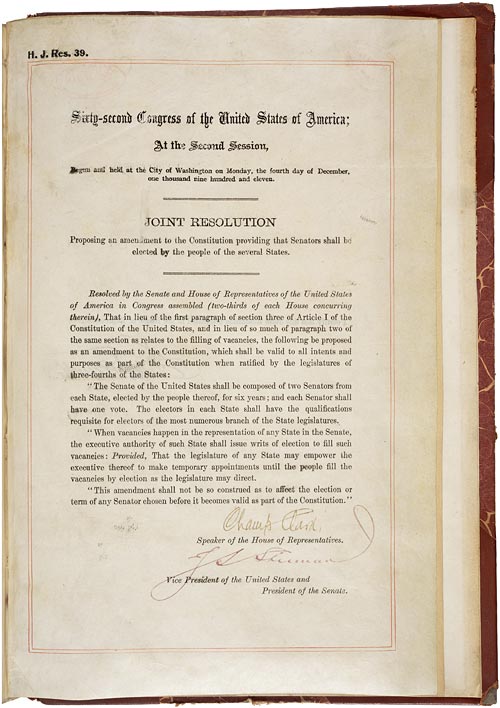
Born near Bethany, Illinois, but later of North Yakima and Seattle, Wesley Livsey Jones became Washington's first directly elected senator under the terms of the Seventeenth Amendment.
1919

Wesley Livsey Jones became chairman of the Senate Committee on Commerce (today's Committee on Commerce, Science, and Transportation), serving until 1930. On January 6, 1930, Jones became the chairman of the Senate Committee on Appropriations, a position he held until 1932.
1922
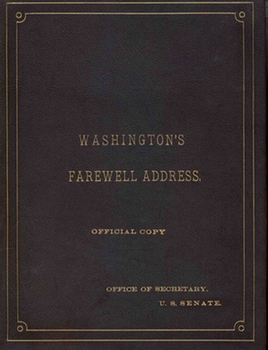
Senator Miles Poindexter delivered George Washington's Farewell Address on the floor of the Senate, a tradition dating to 1862.
1933

Clarence Cleveland Dill, born in Fredericktown, Ohio, but later of Spokane, became chairman of the Senate Committee on Interstate Commerce (today's Committee on Commerce, Science, and Transportation), serving until 1935.
1944
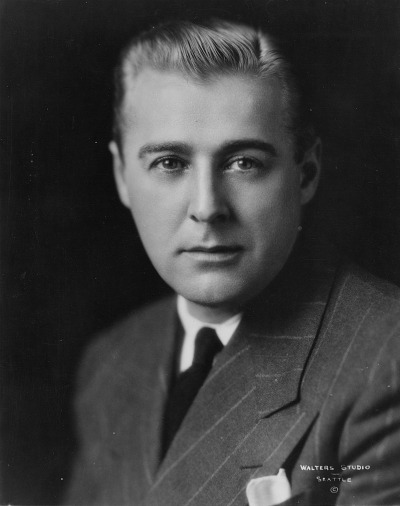
Warren Grant Magnuson ("Maggie"), originally of Moorhead, Minnesota, but later of Seattle, took his Senate oath of office after resigning his House seat.
1953
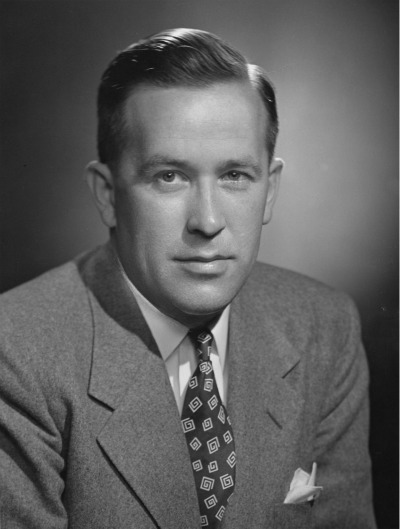
Henry Martin "Scoop" Jackson of Everett began the first of his six terms in the Senate. Reelected five more times, Jackson died in office on September 1, 1983. Jackson was Washington state's first native‑born U.S. senator and was an unsuccessful candidate for the Democratic Party's nomination for president in 1972 and 1976.
1953
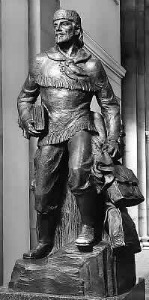
The Senate moved to accept a bronze statue of Marcus Whitman, a pioneer, doctor, and missionary in the Washington Territory, by Avard Fairbanks, for placement in the National Statuary Hall Collection.
1955

Warren G. Magnuson became chairman of the Committee on Interstate and Foreign Commerce and continued to chair the committee in its subsequent incarnations: the Committee on Commerce, 1961–1977, and the Committee on Commerce, Science, and Transportation, 1977–1978. With this continuous service, Magnuson achieved the third-longest tenure of a Senate committee chairman, 23 years and 17 days.
1977

Henry M. Jackson became chairman of the Committee on Energy and Natural Resources, serving until 1981. Jackson had chaired the committee under its former name, the Committee on Interior and Insular Affairs, from 1963 to 1977.
1978
Warren G. Magnuson became chairman of the Committee on Appropriations, serving until 1981.
1979
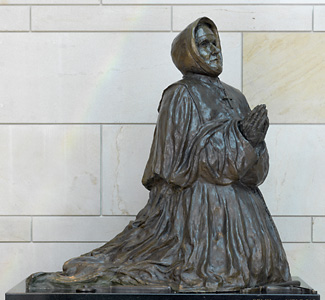
The Senate moved to accept a bronze statue of Pacific Northwest Territory missionary Mother Joseph (Esther Pariseau) by Felix W. de Weldon for placement in the National Statuary Hall Collection.
1981

Warren G. Magnuson ended 36 years of service in the Senate and is Washington State's longest-serving senator. The state's duo of "Maggie" and "Scoop" Jackson, as they were affectionately called by their colleagues, was one of the most powerful Senate delegations of the 20th century. During their 27 years together they were often referred to as the "Gold Dust Boys," reflecting the numerous federal projects and federal assistance they attained for their constituents.
1982

Thomas Slade Gorton, III, born in Chicago but later of Olympia, received the Golden Gavel Award for presiding over the Senate for at least 100 hours in a single session. During this single term in office as the state's Class 3 senator, Gorton received the Golden Gavel award twice more, on September 17, 1984, and on July 29, 1986.
1984
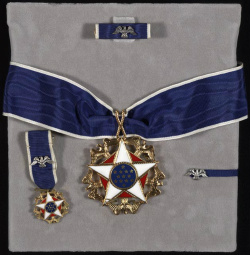
Senator Henry M. Jackson was awarded a posthumous Presidential Medal of Freedom, given by the president of the United States to honor individuals who have made great contributions to either the United States or the world. To date, 30 senators have received the award.
1986

Daniel Jackson Evans of Seattle received the Golden Gavel Award for presiding over the Senate for at least 100 hours in a single session.
1987
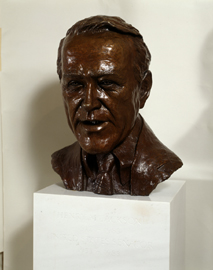
A large bronze bust of Henry M. ("Scoop") Jackson by Wendy M. Ross was unveiled in an alcove of the Russell Senate Office Building.
1988
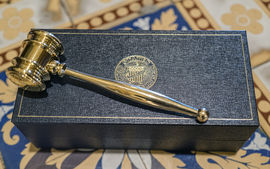
Former senator Thomas Slade Gorton, III of Seattle was again elected to the Senate, this time to the Class 1 seat. Reelected in 1994, Gorton received three more Golden Gavel Awards for presiding over the Senate for at least 100 hours in a single session: September 24, 1996, October 8, 1998, and September 12, 2000. Gorton's six gavels are a Senate record.
2000

The Democratic Conference elected Patty Murray of Seattle, who became Washington State's first woman senator in 1993, chairwoman of the Democratic Senatorial Campaign Committee for the 107th Congress (2001–2003). She became chairman of the campaign committee again in 2011 and served until 2013.
2006
The Democratic Conference elected Patty Murray as Conference secretary for the 110th Congress, a position to which she was reelected on November 18, 2008.
2011
Patty Murray became the first woman to chair the Senate Committee on Veterans' Affairs, a position she held until 2013.
2013
Patty Murray became the first woman to chair the Senate Committee on the Budget, a position she held until 2015.
2013

Maria Cantwell of Edmonds became the first woman to chair the Senate Committee on Indian Affairs, a position she held until February 12, 2014. She then chaired the Senate Committee on Small Business and Entrepreneurship until 2015.
2017
Patty Murray became the assistant Democratic leader—a new position created by the Democratic Conference that ranks third behind the floor leader and the whip. She served in that position until January 2023.
2021
Senator Maria Cantwell became the first woman to chair the Senate Committee on Commerce, Science, and Transportation, a position she held until January 7, 2025. Senator Patty Murray became chairwoman of the Health, Education, Labor, and Pensions Committee, a position she held until February 3, 2023.
2023

The Senate elected Patty Murray as president pro tempore. Murray became the first woman to serve in that position. She was named president pro tempore emerita on January 3, 2025, when Republicans took control of the Senate.
2023
Senator Patty Murray became chairwoman of the Senate Committee on Appropriations, a position she held until January 7, 2025.